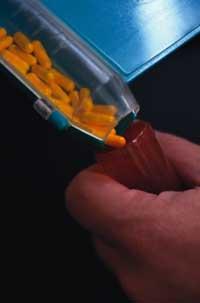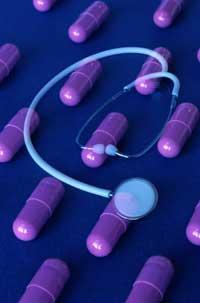Pharmaceutical industry angry but not shaky
2001/09/30 Mendiburu, Joana - Elhuyar Zientziaren Komunikazioa
Since several prestigious health journals have criticized the fact that behind clinical drug research lies the black hand of pharmacies, there has been no environment in the pharmaceutical industry. Something was already known, but this time it has had more impact on the media. However, no total division is expected as both parties are forced to each other.

Thirteen of the most prestigious journals in the world specializing in health claim that henceforth they do not yield to the pressures of pharmacies. Among the signatories are the New England Journal of Medecine, JAMA, British Medical Journal, Annals of Internal Medecine, The Lancet and MEDLINE. It has been reported that, although they consider funding necessary for the conduct of clinical drug research, the scientist should have adequate contracts for the good performance of the work. Contracts must ensure adequate conditions for research, the absence of barriers to access to all information and complete freedom in interpreting results.
Influence of the black hand

70% of clinical drug research is funded by the pharmaceutical industry and all avenues are used to demonstrate the best of the drug and hide the bad in the shade. Hospital and university experts simply sign clinical research and lose control of research results. The pharmacy staff define the characteristics of the research patient team, they are the ones who join and analyze the results and they are the ones who write the report that will be presented to the journal editors. But it is signed by experts. Thus, if one day the incompatibility or fraud of the drug is manifested, it is the responsibility of the latter.
In response to conscience, several researchers have tried to fight fraud. For example, in 1996, Canadian physician Nancy Olivieri demonstrated that the administration of the drug Deferiprone to cure thalassemia, the hereditary disease of hemoglobin, produced liver fibrosis. Apotex threatened to bring him to trial if the results of the investigation were published. However, it did not recede and in 1998, when the results were published, it was expelled from the company.
Something similar happened to researcher Jonathan Allan while researching the influence of CD4 on aids-infected monkeys. It had to be shown that the drug paralyzed the infection, but studies showed that it had reverse effect. The Genetech Pharmacy had already started the advertising campaign and, although it was not willing to accept the result, could not hide it.
Importance of journals

For pharmacies it is very important that research on new drugs be published in a prestigious journal, as they are largely a drug exhibitor. Through magazines, the drug is known to doctors around the world, making it the most direct means to sell many medicines. On the contrary, if the failure or negative effects of a molecule are published, you can lose a lot of money and send the work of the years to the end. Recently, for example, Bayer's shares have declined by 16% due to the case of the Lipobay drug against cholesterol. Therefore, for pharmacies it is very important to have strength to control the results and not publish negative results.
According to Richard Smith, director of the British Journal of Medecine, his initiative should not be considered an attack on pharmacies, although Smith denounced that many brands have concealed on more than one occasion results that do not interest them unscrupulously.

But don't think the tensions between labs and magazines are new. In 1999, for example, because it was "too critical", pharmacies managed to dismiss Georges Lundberd, editor-in-chief of Jama magazine. The editor-in-chief of New England, Jerome Kassirer, opposed the publication of results that the editorial committee did not accept in the annexes of the same destination.
They will remain hooked
Although it is not yet possible to determine the response to the declaration of thirteen journals, they have had the merit of making one of the toughest criticisms the pharmaceutical industry has received.

However, experts attending pharmaceutical industry research believe that criticism will change little. Bernard Bégaud-, an expert from Bordeaux, warns that the power of pharmacies is not new. According to him, "this time he has had more response in the media, but the magazines already knew him for a long time. However, it is true that as pharmacies have merged, their power has become increasingly greater and unsustainable."
For his part, Jean-Pierre Boissel, professor at the Faculty of Pharmacy of Lyon, has criticized the CRO (contract research organisations) companies, hidden behind the pharmacy houses. These societies have represented the working groups of the universities and at present all research passes through their hands.
Surprisingly, from food to medicine the strength of the economy predominates and, to some extent, the whole society has become a great laboratory.
Published in 7K

Gai honi buruzko eduki gehiago
Elhuyarrek garatutako teknologia




